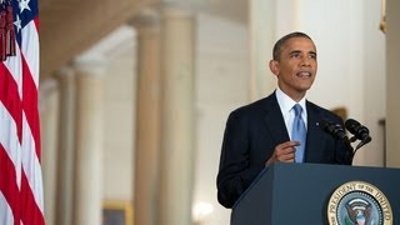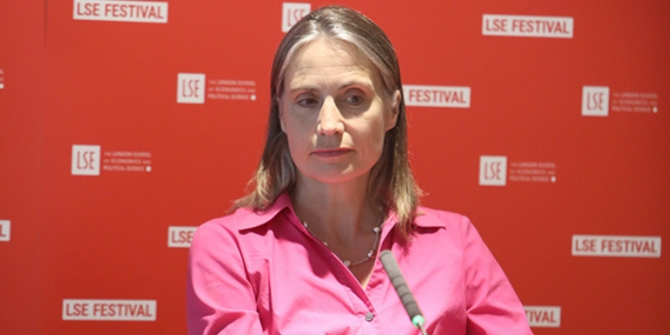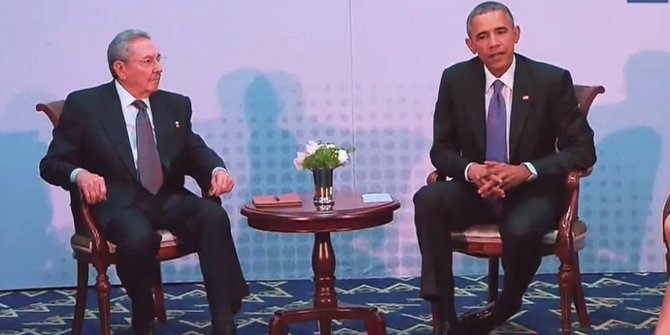 Last month, after a seemingly inevitable march towards U.S. military invention in Syria, a Russian brokered deal was made for the Assad regime to place Syria’s chemical weapons under international control. While many have critiqued what they term President Obama’s ‘improvisational’ foreign policy, Sam Hazelgrove argues that Obama’s actions on Syria are a result of a pragmatic approach that should be seen in the wider context of growing questions over America’s role in the world. He writes that in order to formulate a more coherent foreign policy strategy, Obama’s administration must move to a more centralised decision making process so that immediate national interests can be reconciled with longer term interests.
Last month, after a seemingly inevitable march towards U.S. military invention in Syria, a Russian brokered deal was made for the Assad regime to place Syria’s chemical weapons under international control. While many have critiqued what they term President Obama’s ‘improvisational’ foreign policy, Sam Hazelgrove argues that Obama’s actions on Syria are a result of a pragmatic approach that should be seen in the wider context of growing questions over America’s role in the world. He writes that in order to formulate a more coherent foreign policy strategy, Obama’s administration must move to a more centralised decision making process so that immediate national interests can be reconciled with longer term interests.
The agreement between the United States and Russia last month to bring Syrian chemical weapons under control was a diplomatic achievement that, during the past year, had seemed a political impossibility. A month ago it appeared more than likely that the President would employ military power to deter the Assad regime from using biological weapons in the Syrian civil war. As President Obama fluctuated between the options of non-interference and military intervention in Syria, his critics accused him of reckless improvisation, of leading an Administration with no clear objectives and no coherent strategy in the Middle East.
For example, Stephen Walt argued that the President had been guilty of taking an ad hoc approach to policy, which left the Administration “perennially buffeted by events” and vulnerable to a number of domestic and foreign political pressures. He mentioned that the Administration had fallen back on the familiar rhetorical gambit of lauding democracy, human rights and stability and used this method as a substitute for policy. Consequently, it appeared to many that the United States stumbled into an international agreement that condemned and banned the use of Syrian chemical weapons.

Yet those sympathetic to the Administration’s bind have rebuffed these criticisms and claimed that Obama’s consistency can be located in the historically rooted Jeffersonian principle of an aversion to entangled alliances. However, reflecting on these arguments, we find that both are right. When taken together these two seemingly diametrically opposed views bring to the surface the intellectual tension that has plagued Obama, and disjointed his foreign policy: this is a President who is a pragmatist, and who also possesses a strong sense of moral obligation to certain international norms.
His mission regarding Syria might be described as an exercise in trying to reconcile two competing philosophies. As the President wrestled with this dilemma, he quickly found that there was no good answer to the question of intervention in Syria. Since the beginning on the year the Administration put forward a series of policy initiatives that oscillated between unilateral military action and multilateral engagement: from announcing that the use of chemical weapons crossed a “red line,” to claiming that the Russian proposal for Syria to hand over it’s biological weapons as a “positive development.”
There is, of course, nothing strategically wrong with the Administration taking a more pragmatic approach to Syria, and changing its mind when circumstances in Syria, or in the wider Middle East region, alter (look at the current negotiations with Iran, for example): “the absence of a doctrine [can] make Obama’s foreign policy supple.” This should be considered a prudent method of creating policy. After all, John Kerry even explained to the Senate Foreign Relations Committee upon being nominated as Secretary of State that, “ Never before has the new world order had to be assembled from so many different perceptions, or on so global a scale.” Notwithstanding the absence of a doctrine, a strategy is crucial.
The series of policy initiatives have not been a consequence of the President’s pragmatism, but have resulted from the differing answers that bureaucracies have given to more abstract questions about America’s role in the world. Obama’s existential crisis has permeated foreign policy institutions, resulting in a lack of coherent policy regarding Syria. His Syria dilemma has resulted from the problem of information management as much as it has from the substance of policy.
For example, as the Syrian crisis developed throughout 2012, Obama’s Administration reportedly focused some of their efforts on trying to provide a military solution to the Syrian civil war. Following intelligence reports of chemical weapons use in Syria, discussions were reportedly held about the feasibility training and arming Syrian rebels. Media reports suggest that this proposal was backed by then Secretary of State Hilary Clinton, who argued that the US should become more involved. This, arguably, shows the sense of a moral obligation felt by the Obama Administration to act in Syria at a time when his National Security Adviser Tom Donilon (known as a “cautious realist”) was concerned with shifting America’s hard power to Asia.
The problem of managing information has not just been an inter-institutional one; it has also been an intra-institutional one. A perfect example of this was the moment that John Kerry claimed that, to stop a seemingly imminent US bombing campaign, Assad “could turn over his chemical weapons to the international community in the next week – turn it over, all of it, without delay and allow the full and total accounting.” Almost immediately a spokesperson at the State Department attempted to retract Mr Kerry’s remarks by telling reporters that the Secretary “was making a rhetorical argument about the impossibility and unlikelihood of Assad turning over the chemical weapons he has denied using.”
Diverse discussions across foreign policy institutions that centre on more abstract questions about the national interest, or the use of America power are essential for Obama’s team. However, for the purposes of formulating a coherent strategy and conveying a clear message, it might be argued that there needs to be a slightly more centralised foreign policy decision making process. The conversations that occur between and within the State Department, National Security Council and Defense Department need to be channelled in such a way that, in the words of Richard Haas, “immediate interests [of the United States] can be squared [effectively and seamlessly] with larger [and indeed longer term] national security concerns.”
An important lesson from the Syria dilemma is that the management of information can be as crucial as the substance of ideas to the creation of coherent strategy and, ultimately, the success of policy.
Please read our comments policy before commenting.
Note: This article gives the views of the author, and not the position of USApp– American Politics and Policy, nor of the London School of Economics.
Shortened URL for this post: http://bit.ly/1bvRoF5
_________________________________________
About the author
 Sam Hazelgrove – University of Cambridge
Sam Hazelgrove – University of Cambridge
Sam Hazelgrove graduated from the University of Cambridge with an MPhil in International Relations, where his research focused on US foreign policy. He has a first class Bachelor of Arts degree in American History and Politics from the University of East Anglia. He currently works as a political researcher and contributor to Future Foreign Policy. He tweets @SamHazelgrove.






